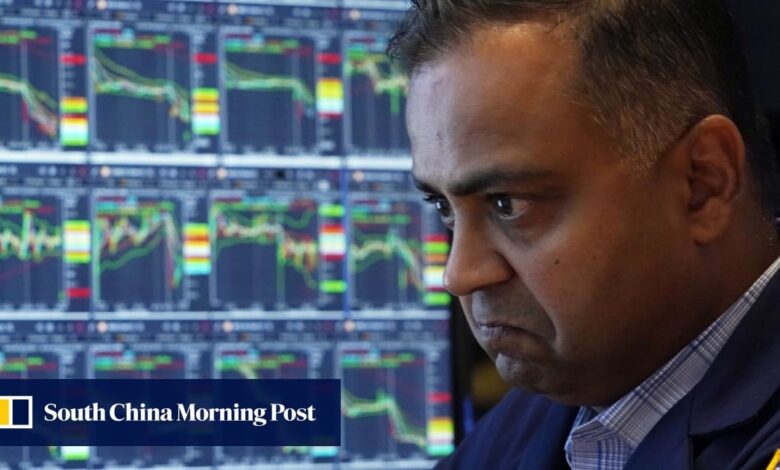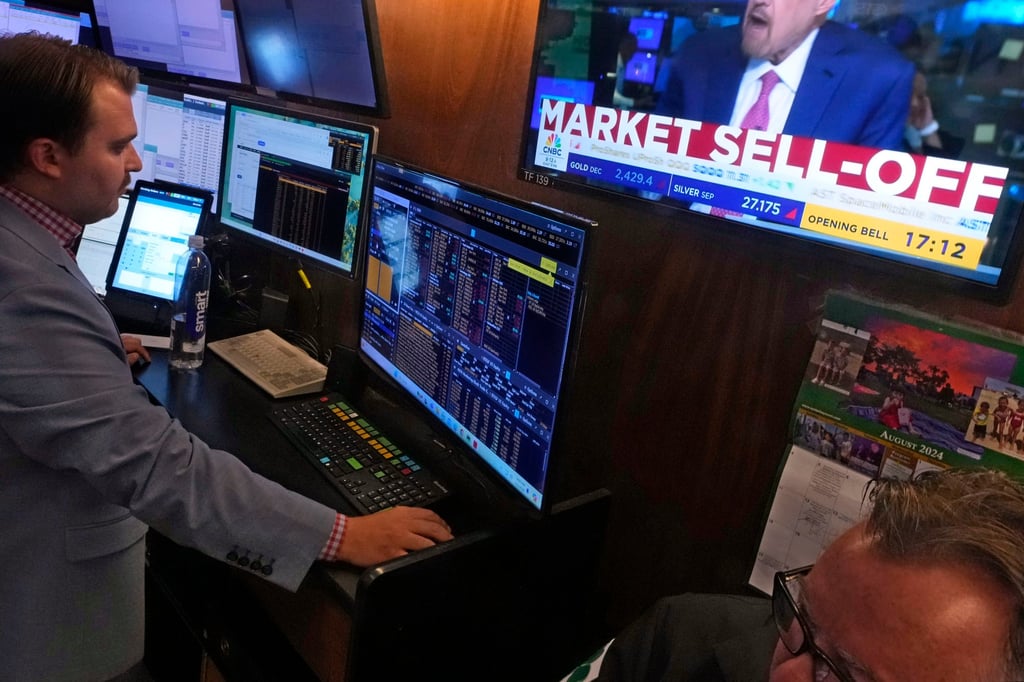Apple, Nvidia lead sell-off as stock markets plunge on US recession fears

US stock futures sunk as investors’ concerns deepened over a slowing US economy and an overheated rally in the tech sector.
Contracts on the Nasdaq 100 fell as much as 6.5 per cent before quickly paring losses to about 4 per cent. S&P 500 futures were down 2.5 per cent, while those tracking the Dow Jones Industrial Average declined 1.6 per cent.
Megacap technology stocks bore the brunt of the sell-off, with chip maker Nvidia falling over 7 per cent and Apple down 6 per cent. Japanese stocks, meanwhile, entered a bear market as the yen extended its recent surge against the dollar.
The latest cause for jitters was data released on Friday showing higher unemployment in July that triggered a closely watched recession indicator, fanning fears that the Federal Reserve hasn’t moved quickly enough to cut interest rates.
Goldman Sachs increased the probability of a recession in the next year to 25 per cent from 15 per cent, although it added there are reasons not to fear a slump.
“We continue to see recession risk as limited,” economists led by Jan Hatzius wrote in a report to clients on Sunday. The economy continues to look “fine overall”, there are no major financial imbalances and the Fed has a lot of room to cut interest rates and can do so quickly if needed, they said.
The Nasdaq 100 dropped into a correction on Friday, with tech still bearing the brunt of the sell-off as investors fret over elevated valuations and the impact of the presidential election on geopolitical tensions. The gauge touched a record high less than a month ago before the AI rally began to falter.

Buffett, Apple
News that Warren Buffett’s Berkshire Hathaway slashed its stake in Apple by almost 50 per cent in the second quarter further drove risk-off sentiment on the tech sector.
The sale of shares in the iPhone maker, which had climbed 23 per cent in the quarter, helped drive Buffett’s cash pile to a record US$276.9 billion.
“It should be hard for anyone to argue that this is not a market negative,” Mike O’Rourke, chief market strategist at Jonestrading, wrote in a report.
Turbulence in Japan – where the central bank has started to raise interest rates as the Fed looks to cut – is also having ripple effects across global markets of various asset classes. This is due to moves to reverse carry trades, in which investors had borrowed at lower rates in Japan to fund purchases of higher-yielding assets elsewhere.
“With yen carry trades now being unwound quickly, not only has the Japanese currency notably broken its depreciation trend against all major units, but risk assets that those trades were financed with are also being sold off,” Asymmetric Advisors strategist Amir Anvarzadeh wrote in a note. Big Fed rate cuts “will only reinforce the recent yen’s strength”.
Dividend plays such as utility and real estate stocks are seen as a possible refuge from the simultaneous drops in tech shares and bond yields. Some early beneficiaries of the rotation out of AI leaders have already started to stumble, with banks and consumer stocks sliding Friday alongside of tech due to recession concerns.
“We have transitioned from a market that could do no wrong to one that is menacing in all characteristics,” J.C. O’Hara, chief technical strategist at Roth Capital Partners, wrote in a note.
“We are in an environment where the narrative, or at least the confidence in the narrative, can shift quickly, which in turn will create further rotation and further risk reduction in the near term.”
Source link



